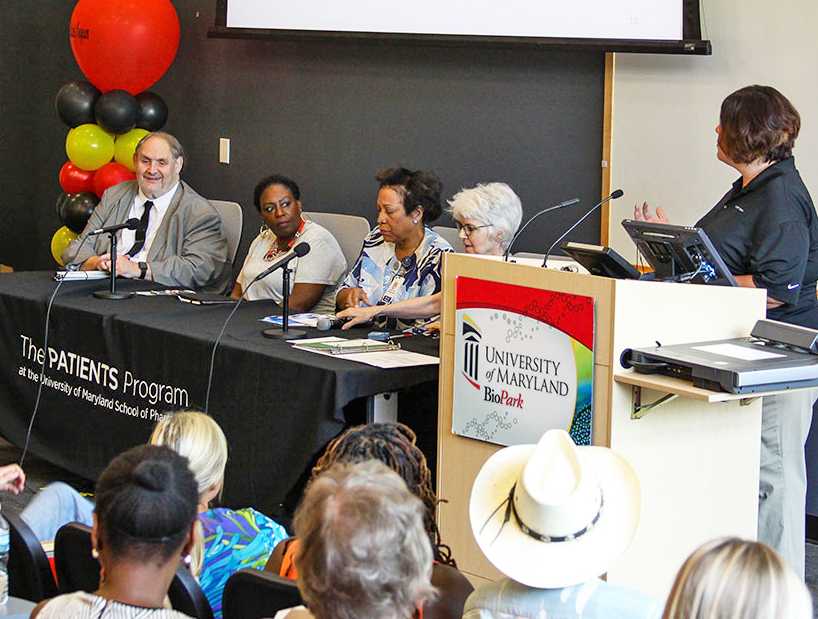PATIENTS Day Panelists Share Advice for Healthier Lives
Nearly 200 community members, health care providers, and researchers came together at the University of Maryland BioPark on July 20 to celebrate PATIENTS Day.
The interactive health fair offered attendees an opportunity to learn from and teach each other how to create and sustain healthy individuals and communities in West Baltimore and nationwide. It was hosted by the Patient-Centered Involvement in Evaluating the Effectiveness of Treatments (PATIENTS) Program at the University of Maryland School of Pharmacy (UMSOP).
“One of the most valuable lessons our team has learned is that health is more than physical wellness — it is a state of well-being,” says C. Daniel Mullins, PhD, professor and chair of the Department of Pharmaceutical Health Services Research and director of the PATIENTS Program at UMSOP. “PATIENTS Day takes what we have learned about building healthy communities and combines it with what we want community members to know about their health, the PATIENTS Program, and our partners.”

Daniel Frye, JD, left, spoke about his experience as a blind patient participating in research during a panel moderated by Michelle Medeiros, MS, MA, CCRP, director of research for the PATIENTS Program at the University of Maryland School of Pharmacy, right.
The half-day event featured three panel discussions that highlighted some of the physical, mental, and social factors that impact community members’ health.
Panelists included entrepreneur Robert Wallace, MBA, who recently was appointed by Gov. Larry Hogan to the Board of Regents of the University System of Maryland, and poet Kondwani Fidel. They were among speakers who took on an ambitious topic: “Health 360: Baltimore Authors Discuss How to Create Health and Wellness in Every Area of Your Life.”
There also were conversations focused on the community’s perspective of research.
“We as a community want to give back,” said Daniel Frye, JD, vice president for public sector engagement strategy at Aira Tech Corp, who spoke about his experience as a blind patient participating in research. “We want to render the world in which we live a better place, and we’re happy to do it if we’re embraced and welcomed by those who are interested enough to do the work in a way that is respectful of who we are.”
Baltimore’s own Ernestine Shepherd who, at age 82, has achieved international fame as Guinness World Records’ “World’s Oldest Performing Female Bodybuilder,” shared how the unexpected loss of her sister inspired her to take her fitness journey to the next level.
“We wanted to inspire others to live a healthy, happy lifestyle by exercising,” said Shepherd. “My sister asked me, ‘If something happened to me, could you continue what we’re doing?’ Little did I know that she was already sick. She had a brain aneurysm, and when she died, I knew I had to continue on, as she wanted.”
However, it was the panel discussion highlighting the impact of gun violence on the health of Baltimore’s residents and neighborhoods that elicited the most impassioned response from attendees, with panelists sharing their experiences growing up in neighborhoods affected by this tragic epidemic.
“I was 12 the first time that I was awakened by gunshots,” recalled Erricka Bridgeford, mediator and community organizer for Baltimore CeaseFire 365. “When I was younger, I assumed this must be what people like me and neighborhoods like mine deserved. You don’t realize that violence is a symptom of the oppressive systems that are happening to your neighborhood. You just think there’s something wrong with the people in your neighborhood.”
She added, “It has been a constant, intimate journey with violence and murder, but what I’m learning is that murder doesn’t get to have the last say, my resilience does.”
Attendees also were invited to take advantage of free blood pressure and HIV screenings, as well as learn more about other support services to empower them to take charge of their health.
“There are a lot of health disparities in Baltimore, so it was great to have this opportunity to attend PATIENTS Day and learn more about resources that we can share with our patients,” said Marquita Carroll, a community health worker at the University Health Center Clinic. “We want to get this knowledge out to the community to help our patients live healthier lives.”
The PATIENTS Program partners with patients and care providers to answer questions about the best treatment options to improve health and quality of life. Funded through a five-year infrastructure development grant from the Agency for Healthcare Research and Quality, the program conducts and funds patient-centered outcomes research, which aims to engage people from all communities – particularly those from underserved populations – in every step of the research process.



